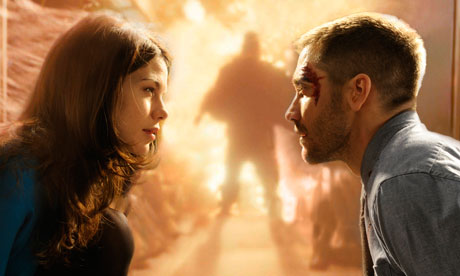Peter Bradshaw: Altered minds, altered states and bags of style – this sci-fi thriller is a superb follow-up for Duncan Jones
- Source Code
- Production year: 2011
- Country: Rest of the world
- Cert (UK): 12A
- Runtime: 93 mins
- Directors: Duncan Jones
- Cast: Jake Gyllenhaal, Jeffrey Wright, Michelle Monaghan, Vera Farmiga

Future shock ... Michelle Monaghan and Jake Gyllenhaal. Photograph: Photo By Jonathan Wenk/Photo: Jonathan WENK
With his debut movie Moon, Duncan Jones made a mighty leap; now with this superb follow-up, he has hit the ground sprinting. Source Code is a terrifically exciting and hugely enjoyable sci-fi thriller, written by Ben Ripley. For pure entertainment, there's nothing around to touch it.
Source Code is about conspiracies, altered minds and altered states, far-fetched in the most elegant and Hitchcockian way, and the sheer outrageousness of it all is muscular and streamlined. The film is about modified reality and inner space, and there are points of comparison with Christopher Nolan's Inception. But the world of Source Code seems to me more interesting, and more able to incubate real drama, real suspense and even some real humour.
At its centre is Colter Stevens, played by Jake Gyllenhaal, a US army helicopter pilot who has crashed in Afghanistan. When he comes to, he finds himself in civilian clothes aboard a crowded commuter train arriving slightly late into Chicago on a glorious summer morning. He appears to be in someone else's body: that of a suburban teacher. Opposite him sits Christina (Michelle Monaghan) who behaves as if a brief nap has merely interrupted their highly flirtatious conversation, but she is then increasingly alarmed as Colter, wild-eyed and panicky, demands to know what is happening and what is going on. After eight minutes, a catastrophic event then hurls Colter back into a situation that is in some ways even more perplexing. He is in uniform, injured and immobilised in what appears to be part of a wrecked military aircraft. Is this real? Or is it the train that's real? Through a video monitor, he must communicate with a woman who is evidently now his commanding officer. Goodwin, played by Vera Farmiga, treats him with the same unreadable solicitousness as Kevin Spacey's robot-voice did with Sam Rockwell in Moon.
Without consenting, Colter has evidently been dragooned into a new mission using futurist technology known as "source code"; he has been brought back from Afghanistan – or has he? – and ordered to relive the past eight minutes on a Chicago commuter train over and over again until he discovers vital information. Ripley and Jones show how each metaphysical go-around discloses more clues; each makes Colter fall for Christina a little more, and each makes the thought of losing her seem more unbearable. With its train setting and Chris Bacon's score imitating the jagged clamour of Bernard Herrmann, the movie is clearly indebted to the Hitchcock of North By Northwest and Strangers on a Train. But it's also a particularly tense and fraught kind of Groundhog Day, and just as in that film, repetition endows banal, forgettable events with an eerie familiarity and inevitability. Yet in the Bill Murray movie, our hapless hero had all the time in the world, an infinity of time, as many Groundhog Days as he needed, to learn the piano until he was at the level at which he could casually appear to be a brilliant pianist to impress a woman. Making an impression on a woman is not wholly absent from Colter's mind either, but he can't just repeat his eight minutes ad infinitum, because the security situation is pressing and time is running out. Each time he starts again, his own physical condition in the mysterious cockpit deteriorates, and Goodwin and her shadowy boss Rutledge (Jeffrey Wright) are keeping secrets from him. Source Code is glitzy and hi-tech in a 21st-century way, but also has something from an earlier age: it is a story from the Twilight Zone, with hints of Philip K Dick, and traces of the television world of The Prisoner and The Fugitive. With its weird deployment of playing cards in one scene, Jones has channelled The Manchurian Candidate – perhaps specifically through Jonathan Demme's Iraq-themed remake – and the overall effect is smart and to the point.
In its own way, Source Code also aspires slightly to the status of comedy, and Colter's increasingly wan and desperate conversations with Goodwin from his mysterious pod reminded me a little of David Niven's radio conversations with Kim Hunter's June in A Matter of Life and Death – as he plummets to his certain death, Niven's character exploits his prerogative as a dying man to flirt with this radio operator. This isn't exactly what is happening here, and Colter's affections are engaged with Christina, not Goodwin – but equipoised with the action and thrills, there is a serio-comic sense of fantasy and romance that have been endangered by this terrifying situation in one sense, but in another sense made possible by it. Source Code is absurd, but carries off its absurdity lightly and stylishly. It is a luxuriously enjoyable film. Jones has put himself into the front-rank of Hollywood directors, the kind who can deliver a big studio picture with brains. With twists and turns, and at breathtaking speed, this film runs on rails.
No comments:
Post a Comment